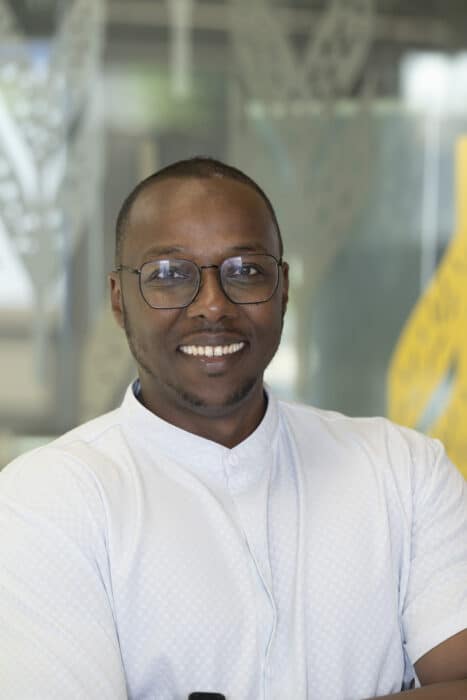Abdulrahman Cherif he / him

Doctoral researcher in AI and sensor-based early detection for individuals at high risk of metabolic conditions
Strategic Research Areas
I am a Public Health Scotland project manager and doctoral researcher exploring how artificial intelligence and sensor technologies can drive early detection and proactive prevention of metabolic conditions among individuals from low socioeconomic backgrounds and those at elevated risk. My research focuses on developing inclusive, practical, and evidence-based digital health research project that enable early risk identification, personalised prevention, and sustainable lifestyle change. My vision is to bridge digital health, behavioural science, and AI ethics to create preventative interventions that enhance wellbeing, strengthen self-management, and empower individuals to become active, informed participants in their own health, shifting from passive patients to engaged health consumers within NHS Scotland pathways.
Achievements/Highlights
- Graduated with Distinction and received the Best Performing Student Award for MSc Digital Health Systems at the University of Strathclyde.
- Awarded Team Member of the Month twice in 2025 (February and November) within the Public Health Scotland Transformation Team.
- Worked across four different NHS Scotland boards, leading the development and implementation of multiple digital health projects and programmes.
- Won the BCS Health & Care Scotland Best Research Poster (ePoster) prize at DigiFest Scotland 2024.
- Contributed to Al-Bir Charity, where my leadership in digital transformation and infrastructure supported the creation of over 200 water wells in Africa, providing clean water to more than 100K people in need.
- Co-designed FODMAP Guru, a prototype dietary app designed to support people with IBS through the Low-FODMAP diet, which later inspired my PhD research.
Doing this PhD matters deeply to me, my family, and my community. Growing up in a family that valued resilience, empathy, and giving back taught me to care about fairness and access in health and education. Seeing how my parents and community faced barriers to quality healthcare made prevention and equality central to my values. Through my work and volunteering, I have witnessed how innovation and collaboration can genuinely improve lives and strengthen communities. For me, this PhD is not just an academic pursuit, it’s a purpose-driven journey to use knowledge and technology to improve wellbeing and create lasting positive change.
I’m a self-taught designer, web-developer, videographer, and photographer who loves connecting creativity and data to tell human stories. I speak Arabic, English, and Dazaga (a Chadian dialect) which helps me engage effectively with diverse communities. And as someone who stands 195 cm tall, I’ve learned that flying economy often turns into a test of endurance for my knees, proof that not all journeys of resilience happen in research!
AI and Sensor-Based Early Detection and Prevention Research Project to Empower Individuals Living in Poverty and at High Risk of Metabolic Health Issues
- Professor Muhammad Ali Imran
- Dr Xianghua (Sharon) Ding
- Professor Qammer H Abbasi
- Public Health Scotland
Motivation
Metabolic conditions such as diabetes, hypertension, obesity, and cardiovascular disease disproportionately affect individuals from low socioeconomic backgrounds. These are often preventable through early detection and sustained behavioural support.
Aims
To research, co-design, and evaluate an AI and sensor-based tool that helps individuals at high risk of metabolic conditions manage lifestyle factors, build self-efficacy, and feel empowered to take proactive steps toward prevention and early intervention.
Methodology
Combines multimodal sensor data, AI-driven risk modelling, behavioural science, and participatory co-design with underserved populations in Scotland.
Impact
The project seeks to enhance early risk identification, promote self-management, and reduce health inequalities through scalable, inclusive digital health solutions.
References
- Public Health Scotland. Scale of obesity challenge in Scotland highlighted by new research
- Public Health Scotland. How large are health inequalities in Scotland?
- Scottish Government. Scottish Health Survey 2024 – Main Report.
- Healthcare Improvement Scotland (SIGN / Right Decisions). Delivering an effective diabetes prevention programme. Summary of evidence incl. digital delivery effectiveness.
- Scottish Health Technologies Group (SHTG). Digital prevention programmes for people at risk of developing type 2 diabetes.
- Ji C, et al. Continuous glucose monitoring combined with AI in prediabetes management: opportunities and challenges.
- Tatli D, et al. Prediabetes detection in unconstrained conditions using wearable CGM and smartwatches.
- Kilfoy A, et al. An umbrella review on how digital health intervention co‑design is conducted and described.
- The King’s Fund. Designing inclusive and trusted digital health services with people and communities.
- Audit Scotland. Tackling digital exclusion.
- Online Nation 2024. UK usage and digital access patterns.
- Kim JK, et al. Detection and analysis of sleep and circadian biomarkers for metabolic syndrome using step count and heart‑rate wearables.
I aim to collaborate with healthcare organisations, AI researchers, behavioural scientists, dietitians, nutrition scientists, and metabolic health specialists to co-create digital interventions grounded in inclusivity and prevention. I am particularly interested in partnerships focusing on:
- AI and sensor integration for metabolic health monitoring
- Behavioural data analysis and digital phenotyping
- Digital inclusion strategies for low-income and high-risk populations
